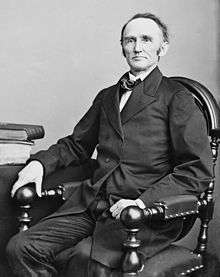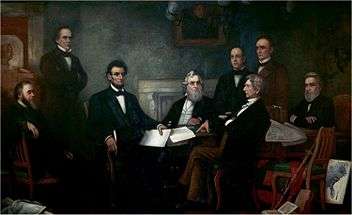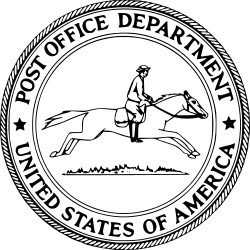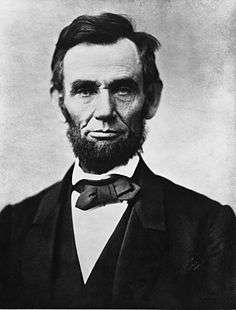Montgomery Blair
| Montgomery Blair | |
|---|---|
 | |
| 20th United States Postmaster General | |
|
In office March 5, 1861 – September 24, 1864 | |
| President | Abraham Lincoln |
| Preceded by | Horatio King |
| Succeeded by | William Dennison |
| Personal details | |
| Born |
May 10, 1813 Franklin County, Kentucky, U.S. |
| Died |
July 27, 1883 (aged 70) Silver Spring, Maryland, U.S. |
| Political party |
Democratic (Before 1854; 1865–1883) Republican (1854–1865) |
| Spouse(s) |
Caroline Buckner (1836–1844) Mary Woodbury |
| Children | 4 |
| Education |
United States Military Academy (BS) Transylvania University (LLB) |
| Military service | |
| Allegiance |
|
| Service/branch |
|
| Years of service | 1835–1836 |
| Rank | Second Lieutenant |
| Battles/wars | Seminole Wars |
Montgomery Blair (May 10, 1813 – July 27, 1883), the son of Francis Preston Blair, elder brother of Francis Preston Blair, Jr. and cousin of B. Gratz Brown, was a politician and lawyer from Maryland. He served in the Lincoln administration cabinet as Postmaster-General from 1861 to 1864, during the Civil War.
Early life and education
Blair was born in Franklin County, Kentucky.[1] His father, Francis P. Blair, Sr.,[1] was, as editor of the Washington Globe, a prominent figure in the Democratic Party during the Jacksonian era, and as a boy Montgomery "often listened to the talk of his father and Andrew Jackson."[2] Blair graduated from the United States Military Academy in 1835, but after a year's service in the Seminole War, he left the Army, studied law, and began practice at St Louis, Missouri, in 1839.[1] In 1836, he married Caroline Rebecca Buckner of Virginia. After her death in 1844, he married Mary Elizabeth Woodbury, daughter of Levi Woodbury.[3] After serving as United States district attorney (1839–43) and as judge of the court of common pleas (1834–1849), he moved to Maryland in 1852 and devoted himself to law practice principally in the United States Supreme Court.[1] He was United States Solicitor in the Court of Claims (1855–58) and was associated with George T. Curtis as counsel for the plaintiff in the Dred Scott v. Sandford case of 1857.[1]
Career

(People in the image are clickable.)
- ^ "Art & History: First Reading of the Emancipation Proclamation by President Lincoln". U.S. Senate. Retrieved August 2, 2013. Lincoln met with his cabinet on July 22, 1862, for the first reading of a draft of the Emancipation Proclamation. Sight measurement. Height: 108 inches (274.32 cm) Width: 180 inches (457.2 cm)
The Blairs, like many other nationalist Democrats, but unusually for politicians from the border states, had abandoned the Democratic Party in the wake of the Kansas-Nebraska Act[1] and had been among the founding leaders of the new Republican Party. After Blair switched political parties, President Buchanan removed Blair from his position of United States Solicitor in 1858.[1] In 1860, Blair took an active part in the presidential campaign on behalf of Abraham Lincoln.[1] After his election, Lincoln appointed Blair to his cabinet as Postmaster-General in 1861.[1] Lincoln expected Blair, who advocated taking a firm stance with the southern states, to help balance more conciliatory members of his cabinet.[4] While Postmaster-General, Blair instituted a uniform rate of postage and free delivery in cities.[1] Blair also began the sale of money orders by post offices in order to reduce the mailing of currency, reducing post office robberies.[1] He also called for the First International Postal Conference, which was held in Paris in 1863 and began the process that led to the Universal Postal Union.[5]
Blair served as Postmaster-General from 1861 until September 1864, when Lincoln accepted an earlier offer by Blair to resign. Lincoln's action may have been a response to the hostility of the Radical Republican faction, who stipulated that Blair's retirement should follow the withdrawal of John C. Frémont as a candidate for President in that year. Regarding Lincoln's action, Blair told his wife that the president had acted "from the best motives" and that "it is for the best all around." After he left the cabinet, Blair still campaigned for Lincoln's re-election and Lincoln and the Blair family retained close ties.[6]
Under Blair's administration, such reforms and improvements as the establishment of free city delivery, the adoption of a money order system, and the use of railway mail cars were instituted—the last having been suggested by George B. Armstrong (d. 1871), of Chicago, who from 1869 until his death was general superintendent of the United States railway mail service.
Differing from the Republican Party on the Reconstruction policy, Blair gave his adherence to the Democratic Party after the Civil War, along with his brother, who was the Democratic vice presidential candidate in 1868.
In 1876, Blair was counsel to Secretary of War William W. Belknap during the House of Representatives investigation into the Trader post scandal. Blair unsuccessfully requested the House Investigation Committee chaired by Hiester Clymer to drop the charges against Belknap if Belknap would resign office. Clymer, however, declined Blair's offer. Belknap was impeached by the House of Representatives for receiving illicit payments from the Fort Sill trader post on the Western frontier while Secretary of War. Belknap had been given sole power by Congress to choose sutlers to operate lucrative trader posts that sold supplies to U.S. soldiers and Indians. Belknap resigned over the scandal and was acquitted in a Senate trial during the summer of 1876. Many Senators did not believe that Congress could convict a private citizen, although the Senate passed a resolution that stated Congress could convict a private citizen.
In 1882, Blair unsuccessfully ran for U.S. Representative from Maryland's sixth district.[1]
Later life and death
His 600-acre (2.4 km2) manor in present-day Silver Spring, Maryland was named Falkland. It was burned by Confederate troops during their thrust towards Washington, D.C. After several years afflicted with "inflammation of the spinal membranes," he died at Silver Spring on July 27, 1883. The funeral services were held at Rock Creek Church, and he was buried at Rock Creek Cemetery.[1] In memory of Blair, the United States Post Office closed on July 30, 1883.[1]
Personal life
Blair's wife was Mary Woodbury, a daughter of Levi Woodbury. Together, they had one daughter, Minnie Blair. They had three sons, Woodbury Blair, Gist Blair, and Montgomery Blair Jr., all of whom were attorneys.[1]
Montgomery Blair and Mary Woodbury Blair were the great-grandparents of actor Montgomery Clift.
In popular culture
- Blair is portrayed by actor Lew Temple in the 2012 film Saving Lincoln.
- In the 2012 film Lincoln, Blair is portrayed by actor Byron Jennings. In the film, Blair is depicted as not being in favor of the 13th Amendment, referring to it as "rash and dangerous" and telling Lincoln that conservative Republicans will only vote for it "if every other possibility is exhausted." Later in the film, he urges Lincoln not to pursue the effort at the amendment's passage.
- To commemorate the centennial of the First International Postal Conference, Blair's portrait appeared on a U.S. airmail stamp, Scott catalogue C66, issued in 1963.
Works
- Speech on the Causes of the Rebellion (1864)
Legacy
Montgomery Blair High School in Silver Spring, Maryland is named after Blair.
Gallery
 Montgomery Blair in his postbellum
Montgomery Blair in his postbellum Lincoln meeting with his Cabinet for the first reading of the Emancipation Proclamation draft on July 22, 1862
Lincoln meeting with his Cabinet for the first reading of the Emancipation Proclamation draft on July 22, 1862
Notes
- 1 2 3 4 5 6 7 8 9 10 11 12 13 14 15 "Montgomery Blair: A Prominent Figure in Political History Passes Away". The Washington Post. July 28, 1883. p. 1.
- ↑ Allan Nevins, The War for the Union, vol. 1: The Improvised War, 1861-1862 (New York: Charles Scribner's Sons, 1959), p. 43.
- ↑ Moroney, p. 5; https://hdl.handle.net/2027/mdp.39015016417332
- ↑ Goodwin, 2005, Chapter 11.
- ↑ Universal Postal Union About history
- ↑ Goodwin, 2005, Chapter 24.
References


- Goodwin, D. K. Team of Rivals: The Political Genius of Abraham Lincoln. New York: Simon & Schuster, 2005. ISBN 1-4165-4983-8 (electronic edition).
Further reading
- Davis, Madison. The Public Career of Montgomery Blair: particularly with reference to his services as Postmaster General of the United States. Washington, D.C.: Columbia Historical Society, 1910
- Moroney, Rita Lloyd. Montgomery Blair, Postmaster General. Washington, D.C.: U.S. Government Printing Office, 1963 44p.
External links
- Biography
- Mr. Lincoln and Friends: Montgomery Blair
- Mr. Lincoln and Freedom: Montgomery Blair
- Mr. Lincoln's White House: Montgomery Blair
- Montgomery Blair at Find a Grave
| Political offices | ||
|---|---|---|
| Preceded by Horatio King |
United States Postmaster General Served under: Abraham Lincoln 1861 – 1864 |
Succeeded by William Dennison, Jr. |

